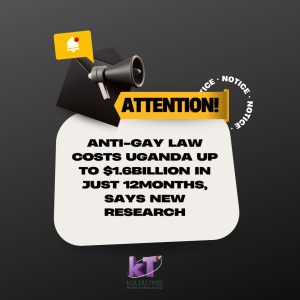The LGBT community is part of approximately 44 million people in Uganda that is reported to be most affected with the Hepatitis B virus in Sub Saharan Africa. Recently, it has been estimated that over 10% of the total population is already living with chronic Hepatitis B infections which is responsible for 80% of all liver cancer cases in the country. According to the New Vision Newspaper (27 July 2018), the highest infections rates of Hepatitis B were found in Karamoja, Northern Uganda, West Nile and in the Western region among people within the age range of 20 to 49 years.
Hepatitis B is an infection which causes inflammation and scarring of the liver over time that gradually leads to the failure of the organ. An individual can contract the Hepatitis B virus when he or she comes into physical contact with body fluids, open sores and cuts of someone who is already infected with the Hepatitis B virus. This can be through kissing, unprotected anal and vaginal sex and sharing needles or syringes. The virus can also be caused by a condition known as autoimmune Hepatitis which results from medications, drugs, toxins and alcohol. The symptoms vary from jaundice, dark urine, stomach pains, loss of appetite, light coloured feces, fevers, loss of appetite, nausea, vomiting and fatigue that persists over periods of time.
The signs might not appear till after 6 months of catching the virus or never manifest at all in a carrier. One can only be checked for the Hepatitis B virus through a complete physical exam by the doctor to find out the health condition of the liver and blood tests can also be carried out to indicate whether the virus is present in the body. This will also reveal if the available antibodies can fight it off. A biopsy of the liver will be done to find out how severe the disease is once it is found to be chronic. However, the best way to prevent getting this illness is through obtaining shots of the Hepatitis B vaccine available in various hospitals around the country before exposure to the virus.
It is also advisable to avoid toxic substances that can hurt the liver like alcohol. In case one is diagnosed with Hepatitis B, they should start treatment immediately. Further preventative measures have been suggested to reduce the prevalence of Hepatitis B in Uganda. Regular condom use is recommended for every sexual encounter. Health workers are continually advised to wear gloves while they clean up after patients. People with open cuts or wounds should keep them covered at all times. Sharing toothbrushes, piercing materials and sharp objects like razors, finger nail clippers, injections and syringes must not be used since they carry bits of blood and other body fluids that might be contaminated, unless they are thoroughly disinfected through proper sterilization.
Vast campaigns should also be carried out widely within the LGBT community through education programs and guidance on screenings for Hepatitis B virus. The dissemination of right information through aggressive campaigns and sensitization materials among health care providers, social service providers and the entire LGBT community will purposefully raise full awareness and understanding of the risk factors, preventative measures and treatments of the virus which will help eliminate chances of spiral infections within our community.




